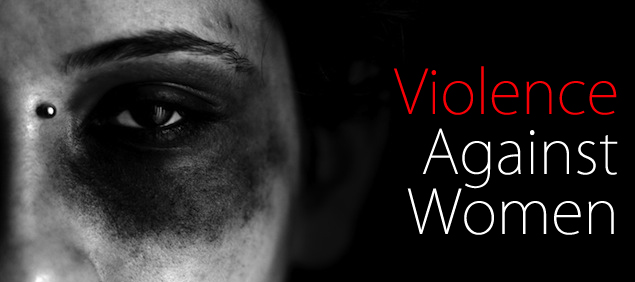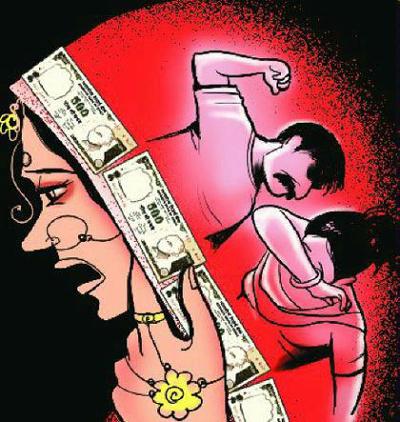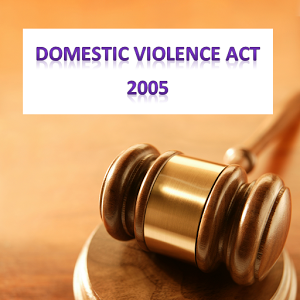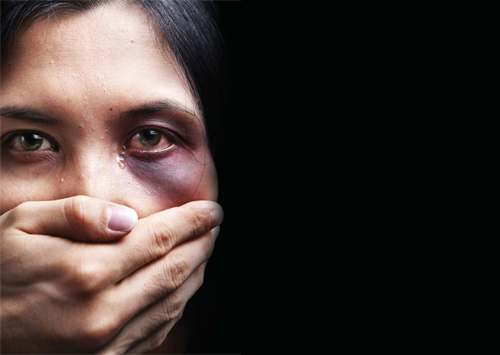Important laws to shield women from domestic violence
 Domestic violence against the woman is wide spread all over the world and in India, females are tortured since ancient time. Women were always considered susceptible and in a position to be exploited. Violence has long been recognized as something that happened to women. Women in India which has a male-controlled society have been facing excessive violence at their homes, particularly, in marital site.
Domestic violence against the woman is wide spread all over the world and in India, females are tortured since ancient time. Women were always considered susceptible and in a position to be exploited. Violence has long been recognized as something that happened to women. Women in India which has a male-controlled society have been facing excessive violence at their homes, particularly, in marital site.
India has approved the Convention on the Elimination of All Forms of Discrimination against Women and the Universal Declaration of Human Rights, both of which guarantee that women must be given equal rights as men and are not endangered to any kind of discrimination.
The Constitution of India also promises substantive justice to women.In simple form, domestic violence is described as all types of actual abuse or threat of abuse of physical, sexual, verbal, emotional and economic nature that can harm, cause injury to, jeopardise the health, safety, life, limb or happiness, either mental or physical of the distressed person. Domestic violence is elaborated by Section 3 of the Act as “any act, omission or commission or conduct of the defendant shall constitute domestic violence in case it:
- Harms or threatens the health, safety, life, well-being, whether mental or physical, of the aggrieved person.
- Harasses, harms, injures or endangers the aggrieved person with a view to force her or any other person related to her to meet any illegal demand for any dowry or other property or valuable security.
- Has the effect of threatening the distressed person or any person related to her by any conduct mentioned in clause (a) or clause (b); or otherwise injures or causes harm, whether physical or mental, to the aggrieved person.
To observe many cases of the domestic violence in society, the parliament of India passed section 498A in 1983. First time, domestic violence was acknowledged as a specific criminal offence. This section deals with brutality by a husband or his family towards a married woman.
Under IPC section 498A, womanis protected from four types of cruelties:
- Conduct that instigate a woman to suicide,
- Conduct which is likely to cause grave injury to the life, limb or health of the woman,
- Harassment with the purpose of forcing the woman or her relatives to give some property,
- Persecution because the woman or her relatives is unable to yield to demands for more money or does not give some property.
- Persistent denial of food.
- Insisting on stubborn sexual conduct.
- Continually locking a woman out of the house.
- Denying the woman access to children, thus causing mental torture.
- Physical violence.
- Taunting, discouraging and putting down the woman with the intent of causing mental torture.
- Restricting the woman at home and not permitting her normal social contact.
- Abusing children in their mother’s presence with the purpose of causing her mental torture.
- Denying the fatherhood of the children with the intention of causing mental pain upon the mother.
- Intimidating divorce unless dowry is given.
- Right to reside in a shared household:The Act safeguards a woman's right to reside in the marital or shared household even if she has no title or rights in the household. A part of the house can be selected to her for her personal use. A court can pass a residence order to secure her right of residence in the household.
The Supreme Court has ruled in judgment that a wife's claim for other accommodation lie only against her husband and not against her in-laws and that her right to 'shared household' would not extend to the self-acquired property of her in-laws. - Right to obtain assistance and protection:A woman who is mistreated by acts of domestic violence will have the right to avail the services and assistance of Police Officers, Protection Officers, Service Providers, Shelter Homes and medical establishments as well as the right to simultaneously file her own complaint under Section 498 A of the Indian Penal Code for matrimonial cruelty.
- Right to issuance of Orders: Woman who is victimized by domestic violence can get the following orders issued in her favour through the courts once the crime of domestic violence is prima facie established:
- Committing any acts of domestic violence.
- Helping or abetting in the act of domestic violence.
- Entering the place of employment of upset person or if the person is child, its school or any other places.
- Trying to communicate in any form including personal, oral or written, electronic or telephonic contact.
- Alienating any assets, operating bank account, bank locker held or enjoyed by both parties jointly or singly by the respondent including her stridhan.
- Causing violence to the dependents, or other relative or any other person who give the assistance to the aggrieved person.
- Committing any other acts indicated by the protection officer.
- Restraining the respondent from depriving or in any manner disturbing the peaceful possession of the shared household.
- Directing the respondent to remove himself from the shared household.
- Warning the respondent or his relatives from entering any portion of the shared house hold where the aggrieved person lives.
- Restraining the respondent from isolating or disposing of the shared house hold or encumbering it.
- Restraining the respondent from renouncing his right in the shared household.
- Directing the respondent to secure same level of alternate accommodation for the distressed person as enjoyed by her or to pay rent for the same if the situations so require.
- Loss of earnings.
- Medical expenses.
- Loss caused due to destruction or removal or damage of any property.
- Pass order as to maintenance for the aggrieved person as well as her children if any.
- The qualifications and experience to be possessed by a Protection Officer and the terms and conditions of his service.
- The form and manner in which a domestic incident report may be made.
- The form and the manner in which an application for Protection Order may be made to the Magistrate.
- The form in which an application for legal aid and services shall be made.
- The other duties to be completed by the Protection Officer.
- The rules regulating registration of Service Providers.
- The means of serving notices.
- The rules regarding counselling and procedure to be followed by a Counsellor.
- The rules regarding shelter and medical assistance to the aggrieved person.
- The rules regarding breach of Protection Orders.
- Causes and remedy for dark circles in females

- Harmful impact of mobile phone on unborn baby
- Maternal health care tips

- Rheumatoid Arthritis is Most Widespread in Female
- Periodontal ailment during Pregnancy
- Anemia is prevalent in Women
- Tips for making budget in Indian wedding

- Important laws to shield women from domestic violence
- Tips to Remove makeup through natural process
- Different kinds of Contraceptives for Women
- Family
- Home Remedies to Black Heads
- Night Shift increases chances of Cancer
- Pumpkin Aroma arouses Sexual Urge in Men
- Risk Factors For Middle-Aged Expecting Women
- Justice at Last : Shanti Mukund Hospital rape case
- Simple Wrinkle free Beauty Tips for Women
- Vegetable Carving
- Wakeup to Duplicate Cosmetics
- Woman, a True Companion
- Self-defence tips and training
- Are you a Perfectionist?
- Free India Recipes
- Love and Time
When to file case for domestic violence:
Woman can file a case for domestic violence, she is suffering, if,
Rights of women in their matrimonial home:
The married home is the household a woman shares with her husband. Whether it is rented, officially provided, or owned by the husband or his relatives, there are many rights of woman in this home. A woman has the right to stay in the marital home along with her husband as long as she is married, though there is no certain law regarding this right. If a woman is being hassled to leave the matrimonial home, she can ask the Court for ban or "restraining order" to shield her from this type of domestic violence. This can generally be obtained effortlessly.
It is generally suggested that woman suffering from mental or physical torturemust not to leave the matrimonial home. She can easily get a court order preventing her being thrown out than to get an order imposing her right to return to it once she has left or been thrown out.
Concept of Injunction' and its application to domestic violence cases: An injunction is a court order directing a person to do or not to do something. A woman has great flexibility regarding what she can request the Court to order. For example, if she is being trailed by somebody (including her husband), she can obtain injunctions against the person coming near her home or place of work, or even telephoning her.
Action in the case of dowry-related harassment or dowry death:
 The law under Section 498A of the Indian Penal Code include dowry-related persecution as well. If woman are being hassled for dowry by in-laws or husband, the provision provides her protection and allows her to go to court to dissuade this kind of harassment. Though, there is specific provision under section 304-B that talks about dowry death; however, woman does not need to wait for that instead filing a case under 498A is an apt solution.
The law under Section 498A of the Indian Penal Code include dowry-related persecution as well. If woman are being hassled for dowry by in-laws or husband, the provision provides her protection and allows her to go to court to dissuade this kind of harassment. Though, there is specific provision under section 304-B that talks about dowry death; however, woman does not need to wait for that instead filing a case under 498A is an apt solution.
The Indian Penal Code also reports dowry deaths in section 304-B. If a woman loss her life due to unnatural causes within seven years of marriage and has been harassed for dowry before her death, the Courts will accept that it is a case of dowry death. The husband or in-laws will then have to give evidence that death was not because of any harassment. A dowry death is indictable by imprisonment of at least seven years.
When filing an FIR (First Hand Report), in a case where a woman is suspected to have been murdered after constantcruelty due to dowry demands, the complaint should be filed under section 304-B instead of under section 306, which deals with abetment to suicide. Section 306 should be appealed when a woman commits suicide because of dowry-related harassment.
Torture to have sex with husband
In India, there is no legal guidelines on marital rape, even if a woman's husband has sexual intercourse with her or without her consent. Husband cannot be impeached for rape.
However, excessive and irrational demands for sex, or demands for unnatural sex have been considered type of brutality and may allow a woman to a divorce.
If a woman is judicially separated, her husband is not allowed to have sexual intercourse without her consent. If he does, he can be accused under section 376-A of the IPC. It is to be noted that consent under pressure (such as because of threats to injure or to stop paying maintenance) is not considered legal reason.
Other Laws that Provide Protection against Domestic Violence:
Besides, 498A, the parliament of India also implemented the Protection of Women from Domestic Violence Act 2005 to protect women from domestic violence. The law was brought into force by the Indian government from October 26, 2006 and as of November 2007; it has been approved by four of twenty-eight state governments in India for example Andhra Pradesh, Tamil Nadu, Uttar Pradesh and Odisha.
The Protection of Women from Domestic Violence Act 2005 is an Act of the Parliament of India enacted to protect women from domestic violence. It was brought into force by the Indian government from 26 October 2006. The Act gives for the first time in Indian law a description of "domestic violence". It included not only physical violence, but also other forms of violence such as emotional/verbal, sexual, and economic abuse. It is a civil law and has aim to protect orders and not meant to penalize criminally. The act does not extend to Jammu and Kashmir, which has its own laws, and which passed in 2010 the Jammu and Kashmir Protection of Women from Domestic Violence Act, 2010.
Prominent features of the Protection from Domestic Violence Act, 2005 are as follows:
 Basically, this Act include those women who are or have been in a relationship with the abuser where both parties have lived together in a shared household and are related by consanguinity, marriage or a relationship in the nature of marriage, or adoption and people live as a joint family. Even those women who are sisters, widows, mothers, single women, or living with are permitted to get legal protection under the proposed Act.
Basically, this Act include those women who are or have been in a relationship with the abuser where both parties have lived together in a shared household and are related by consanguinity, marriage or a relationship in the nature of marriage, or adoption and people live as a joint family. Even those women who are sisters, widows, mothers, single women, or living with are permitted to get legal protection under the proposed Act.
One of the strikingaspects of the Act is the woman’s right to secure housing. The Act offers for the woman’s right to live in the marital or shared household, whether or not she has any title or rights in the household. This right is secured by a residence order, which is passed by a court. These residence orders cannot be passed against anyone who is a woman.
The other relief visualised under the Act is that of the power of the court to pass protection orders that prevent the abuser from supporting or committing an act of domestic violence or any other specified act, entering a workplace or any other place visited by the abused, attempting to converse with the abused, isolating any assets used by both the parties and causing violence to the abused, her relatives and others who provide her help from the domestic violence.
The draft Act provides for appointment of Protection Officers and NGOs to extend support to the woman w.r.t medical examination, legal aid, safe shelter.
The Act provides for breach of protection order or temporary protection order by the respondent as a cognizable and non-bailablecrime punishable with imprisonment for a term which may extend to one year or with fine which may extend to twenty thousand rupees or with both. Likewise, non-compliance or discharge of duties by the Protection Officer is also sought to be made an offence under the Act with similar punishment.
Rights granted to women: There are many rights granted for woman in Indian law:
Protection orders:
 The domestic violence Act gives many opportunities for both parties to put their evidence and once it is satisfied that a prima facie case of domestic violence has happened or is likely to take place, passes a protection order in favour of the woundedwoman. The order forbids the respondent from the following acts:
The domestic violence Act gives many opportunities for both parties to put their evidence and once it is satisfied that a prima facie case of domestic violence has happened or is likely to take place, passes a protection order in favour of the woundedwoman. The order forbids the respondent from the following acts:
Residence orders:
In this alternate order, the magistrate after hearing the both parties and after getting convinced that a domestic violence has happened passes residence order such as:
Monetary relief:
Another option available for woman who is tortured by other people is go to court and ask for financial relief. The magistrate may direct the respondent to pay monetary relief to meet the expenses of the aggrieved person and child if any. It may include:
Custody Orders:
This order grants temporary custody of any child or children to the aggrieved person or any person making an application on her behalf. It may make arrangements for visit of such child or children by the Respondent or may disallow such visit if it is harmful to the interests of the child or children.
Compensation Orders: The Respondent may be directed to pay compensation and damages for injuries caused to the aggrieved person due to domestic violence by the Respondent. Such injuries may also include mental torture and emotional distressed caused to her.
Interim and Ex parte Orders: These types of orders may be passed if it is thought just and proper upon commission of an act of domestic violence or probability of such commission by the Respondent. Such orders are passed on the basis of an affidavit of the aggrieved person against the Respondent.
Procedure of filing complaint and the court's duty:
The victim or any other witness of the crime on her behalf can contact a Police Officer, Protection Officer, and Service Provider or can directly file a complaint with a Magistrate to get orders or reliefs under the Act. The informant who in good faith provides information relating to the offence to the relevant authorities will not have any civil or criminal responsibility.
The court is required to take knowledge of the complaint by starting a hearing within three days of the complaint being filed in the court. After that the Magistrate shall give a notice of the date of hearing to the Protection Officer to be served on the Respondent and such other persons as directed by the Magistrate, within a maximum period of 2 days or such further reasonable time as allowed by the Magistrate.
The court is required to settle the case within 60 days of the first hearing. The court, to establish the offence by the Respondent can use the sole testimony of the wounded person. When court finds the complaint genuine, the court can pass a Protection Order, which shall remain in force till the aggrieved person applies for discharge. If upon receipt of an application from the aggrieved person, the Magistrate is satisfied that the conditions so require, he may modify or cancel an order after recording the reasons in writing.
Woman can also file a complaint under Section 498 A of the Indian Penal Code, which defines the offence of matrimonial vindictiveness and prescribes the punishment for the husband of a woman or his relative who subjects her to cruelty.
Penalty/punishment:
For Defendant:
The breach of Protection Order or interim protection order by the Respondent is a cognizable and non-bailablefelony. It is punishable with imprisonment for a term, which may extend to one year or with fine, which may extend to twenty thousand rupees or with both. He can also be tried for offences under the Indian Penal Code and the Dowry Prohibition Act.
For Protection Officer:
If officer fails or does not discharge his duties as directed by the Magistrate without any adequate cause, he will be answerable for having committed an offence under the Act with similar punishment. However, he cannot be penalized without the prior sanction of the state government. Furthermore, the law protects him for all actions taken by him in good faith.
Appeal:
An appeal can be made to the Court of Session against any order passed by the Magistrate within 30 days from the date of the order being served on either of the parties.
The protection of women from domestic violence rules 2005:
 The Act authorizes the Central government to make rules to perform the provisions of the Act. To do this power, the Central government has issued the Protection of Women from Domestic Violence Rules 2005 relating to the following matters:
The Act authorizes the Central government to make rules to perform the provisions of the Act. To do this power, the Central government has issued the Protection of Women from Domestic Violence Rules 2005 relating to the following matters:
It is realized that domestic violence is extremely complex and vicious form of abuse committed most often with in home and it is deep rooted in socio economic structure. There are laws to protect woman from domestic violence. Important law, the protection of woman from domestic violence Act, 2005 describes the expression domestic violence to include actual abuse or threat of abuse, physical sexual, verbal, emotional or economic violence.
Domestic violence can also be seen as a violation of fundamental right to live with dignity and the right for equality and equal protection of the law guaranteed under the Indian constitution. Women must be aware of their rights to shield themself and live a respectful life in society.